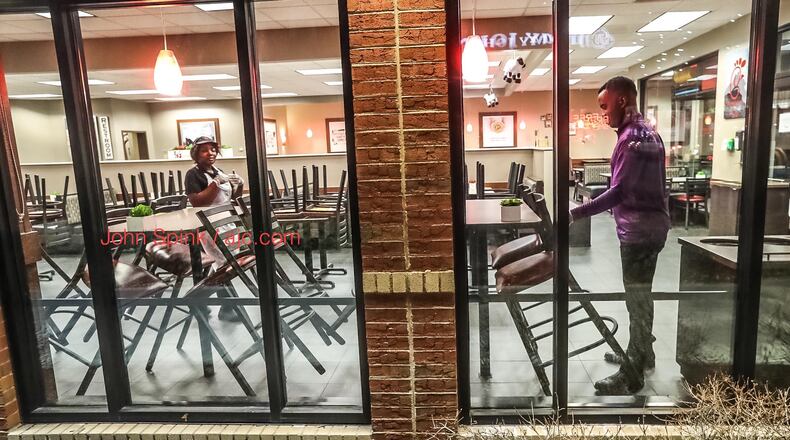As virus-linked actions slam the brakes on the metro Atlanta economy, the first to be hurt are the workers who are already in the most precarious positions, earning low wages and living paycheck to paycheck.
The impact will be bad for workers and their employers as well as for the broader economy, according to experts.
Much of the U.S. economy has slowed dramatically, starting with restaurants, hotels and travel companies coping with empty rooms and canceled plans. Many of them are already letting workers go.
That will include many of the roughly 925,000 people in the metro region — 40% of all workers — whose jobs pay $15.40 an hour or less, said Nicole Bateman, policy analyst at the Brookings Institution. “This is a population that is extremely vulnerable. We will see people who already had trouble taking care of basic needs unable to pay the rent and pay their bills.”
Those low-wage workers are often without sick leave and are less likely to have health insurance than white-collar workers. They are also much likelier to be in jobs that cannot be done on a laptop from home.
Many of those jobs are in the sectors that were the first to close in the past week — and the most likely to be hit in coming days.
Hospitality, for example, in metro Atlanta employs roughly 300,000, according to the Bureau of Labor Statistics. There are about 52,160 waiters and waitresses, 24,000 restaurant cooks and 75,670 people working in other kinds of food preparation, including fast food, where the average wage is $9.37 an hour.
As restaurants go to "take out only" — or close altogether — many of those people see their jobs cut.
Inevitably, they will struggle, said Alex Camardelle, a senior policy analyst at the Georgia Budget and Policy Institute.
As with the painful recession of a decade ago, the result will be a flood of people looking for help, the way that SNAP — the program commonly called "food stamps" — surged to 2 million recipients across the state, or about one in five residents.
“The closing may be necessary, but we don’t have an economic system in place to support those workers,” he said. “These folks are going to deplete their savings or they are going to go deeper into debt.”
In January, the Georgia unemployment rate was 3.1% — a historic low. On Thursday, the Georgia Department of Labor will release its jobs report for February, likely showing a still-strong job market. But like light from a distant star, it will be a snapshot of the past, taken the month before the crisis accelerated.
What about the future? Short-term economic projections are grim: J.P Morgan Chase predicted U.S. gross domestic product will shrink 3% in the second quarter — and it was among the optimists. Goldman Sachs, for example, forecasts a 5% drop.
But those are guesses at best, since health experts cannot predict how long the need for economy-throttling measures will be necessary, said economist Gray Kimbrough at American University. "Nobody really knows what we are going to do if it drags on for months. It is pretty clear that the economic impact is going to be significant."
And no matter how long the crisis continues, the first wave of layoffs will be a weight on the economy, as laid-off low-wage workers scramble just to obtain necessities, he said. "This can certainly impact the economy as a whole. It will make the decline deeper and make it harder to recover."
The economic storm will ravage a range of sectors: manufacturers face gaps in the supply chain, financiers watch Wall Street's swings and fret about credit, housing markets are suddenly chilled.
In past downturns, “economists believed the strength of the U.S. economy was the consumer, and each time the consumer proved resilient and stabilized the economy,” said Michael Wald, former Labor Department senior economist.
But unlike any past economic crisis, this one begins with consumer spending shut off — whether from fear or government order, he said.
"That is significantly different. This is the first time the U.S. economy has faced a service industry-led recession. Jobs in the service industry — both low-paid and highly paid — no longer will look as secure as they did in the past."
About the Author
Keep Reading
The Latest
Featured



